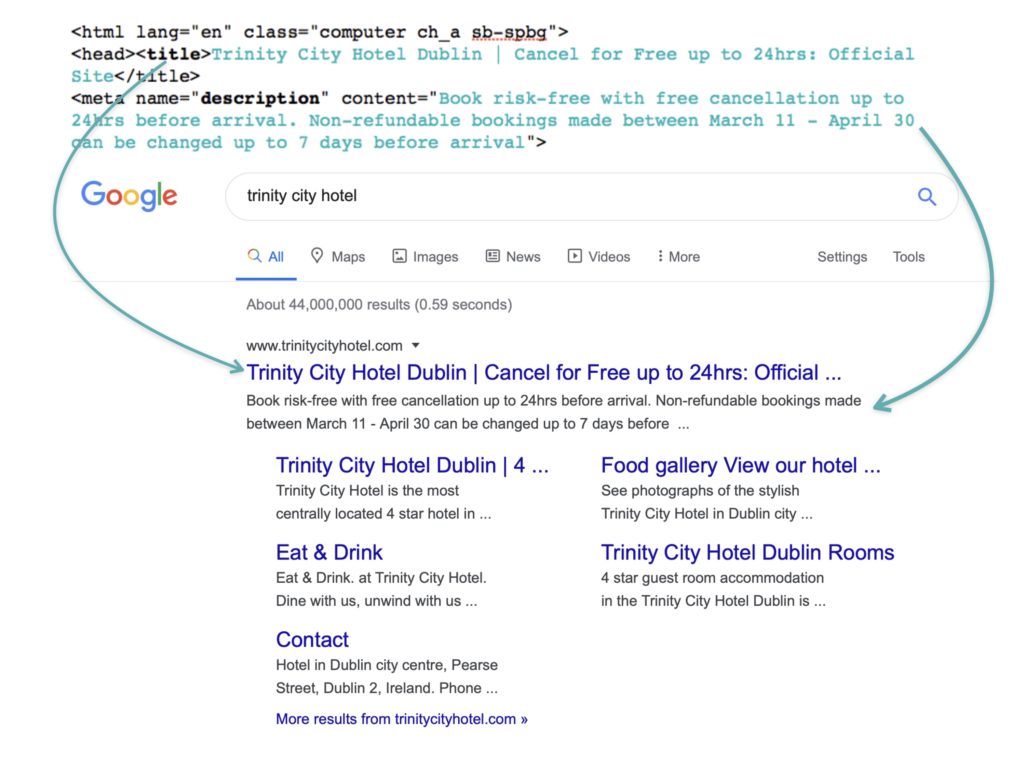
SEO for hotel websites is a strategy, that is often overlooked in favour of paid strategies such as PPC ads or Metasearch campaigns.
NB: This is an article from Bookassist
But in the current climate it is an area that deserves much more attention. Due to declining investment, PPC ads and Hotel Ads that once dominated Google results are now showing less often. It’s organic results that dominate now.
Investing time in SEO can generate positive results right now as well as in the future. Small changes to your page titles and meta descriptions can influence your appearance in SERPs almost immediately, while deeper changes across your whole site can help increase visibility and traffic when search volume improves following a future recovery.
Page titles and meta description tags
It is important to understand how page titles and meta description tags work, in order to update them in the best possible way. Most website content management systems (CMSs) have a facility to update titles and tags by page, so it is a relatively simple exercise. When looking for the snippet of information that Google and other search engines present on the SERP, this is the first port of call. The example below shows how the title and description tag from the page HTML code is reflected in the results on Google.

Google doesn’t always use the text as added to the description tag, sometimes preferring to use text from the page content, particularly if it is more relevant to the query used (see Ahrefs study). But for brand related terms, the hardcoded meta description is most frequently used.
It is important to think carefully about the message you want to present – descriptions that usually work well might not be as relevant in the current situation. Think about what future bookers are worried about – risk free cancellations, ability to change dates etc, and add a message to address those more timely concerns. It can easily be changed at a later date when that message is no longer as relevant. Remember also that the text will be truncated by Google if it is too long, so try to keep titles under 60 characters in length and meta descriptions under 155 characters as an approximate guideline. See Google’s Webmaster Guidelines for more advice.
Content Creation
If, like many website owners, your site has not changed much since its creation, then now is a good time to start looking at a content refresh and to research new ideas and topics that you can include. Your homepage should be your first priority – this is the page that most visitors will find first, so review it to make sure the content is fresh and that it is user friendly. Remember that your opinion is not the same as others, so reach out to friends, family & colleagues to create an informal focus group of people who can give feedback on your content and website usability that may be very different to your own perception. Tools like SurveyMonkey offer a free version to allow you create feedback surveys quickly and easily, which will then allow you to analyse the results and make changes accordingly.
When looking at content, the first step is to prioritise existing pages by traffic – a custom report in Google Analytics will show you Organic landing pages by user volume, so you can start on the most important pages and work your way down the list. It is also a good idea to look at your website performance in Google Search Console to see what pages and queries are performing well on Google, as well as to prompt some ideas of where improvements could be made.
Some key areas to consider include:
- Text content – does in need to be refreshed or expanded?
- Pages – are there opportunities to create new pages in your site or blog
- Images – are they up to date or starting to look tired?
- Video – do you need to update or add video? This is something that could be scheduled for the future.
- Languages – do you see future opportunities in other markets? If so it could be worthwhile investing in translations for those markets.
- Historical data – review analytics from Q2/Q3 last year to identify pages that could bring seasonal traffic and update with new messaging and offers
Featured Snippets
Featured snippets are a relatively new addition to the SERP, but we have all used them, maybe without even noticing. The idea is to present a useful answer to your query without the need for you to leave the Google page. As this snippet appears above position one in the organic results, it is commonly referred to as Position Zero. There are pros and cons to appearing at Position Zero, as the snippet gets fewer clicks than a standard organic result, but it does create brand visibility and establishes your website as an authority on that particular query. An even bigger benefit is that the feature snippet is frequently returned as the answer when a voice search is performed on a Google device or mobile. These snippets are less likely to appear for commercial enquiries ( eg family hotels) than for general enquiries (eg family activities)
Although it is very difficult to appear as a Featured Snippet, there are a number of steps that will improve your chances.
- Use your content to answer queries – who, what, how etc
- Structure your content in a way that Google can replicate easily – bullet points, tables, distinct paragraphs etc
- Use Structured Data on your page to provide search engines with more information
- Create an FAQ page on your website, starting with common questions guests ask over the phone and at reception, and build it from there
- Add new pages to your website or blog with common activities, events, things to do etc near your property.
In summary, now is a good time to invest in your website by reviewing content and appearance, to ensure that you are fully prepared for when search volume improves as things recover.




